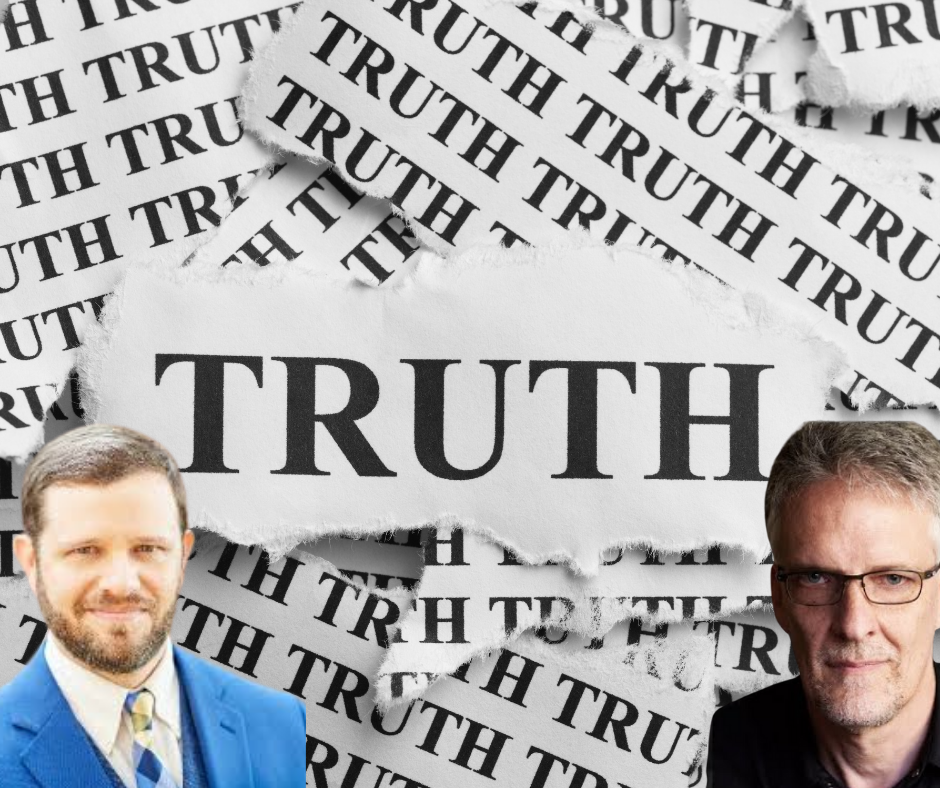Introduction
In a recent episode of Revelationary on Air, presuppositional apologists Dr. Chris Bolt and Brian Knapp had some things to say about me. For those who are not aware, Dr. Bolt and myself have had a respectful but spirited ongoing dialogue regarding the differences between his presuppositionalism and my evidentialism. I offered a general critique of Greg Bahnsen’s presuppositional apologetics in a video entitled “What’s Wrong With Presuppositional Apologetics: A Response to Greg Bahnsen.” Bolt responded with a video entitled “A Response to David Pallmann – Part 1.” I offered a rejoinder to Bolt titled “What’s STILL Wrong With Presuppositional Apologetics: A Response To My Critics.” (See the end of this article to find links to all videos cited). While Bolt and Knapp made it clear that this latest episode of Revelationary on Air was not going to be a rigorous or full response to me, I wanted to address the comments which they made about me.
Let me begin by noting that I genuinely appreciate the respect with which Bolt and Knapp treated my arguments. Unlike many encounters with presuppositional apologists which I have had, I believe that they took my arguments seriously and are interested in a genuine dialogue rather than just scoring rhetorical points. It is in the interest of carrying this good-faith dialogue further that I am writing this reply. As a warning, for the sake of keeping this article brief, I will be assuming knowledge of some technical terms and concepts detailed in the videos linked at the bottom. Those who find my terminology unclear are invited to watch the videos.
Acquaintance and Correspondence
By way of review, I have advocated for a model of non-inferential justification based on the theory of direct acquaintance and the correspondence theory of truth. While Bolt has had some things to say about acquaintance theory in the past, in this episode, Bolt and Knapp are more concerned with my dependence upon the correspondence theory. Crudely but briefly put, the correspondence theory of truth says that a proposition is true if and only if it corresponds to reality. The idea is that a thought (or a belief or a sentence) is true when it accurately describes or matches some state of affairs.
At about 9:53 Knapp offers an objection to my dependence upon correspondence theory. He says, “This particular epistemology … if it relies upon this particular theory of truth — the correspondence theory — then there needs to be some reason, he needs to offer some sort of justification for why a correspondence theory of truth is ‘true.’ … Obviously when we start talking about the ‘truth’ of a theory of truth we run into a difficulty and that is, what do you mean by is it true? If your definition of what it means to be true is going to be consistent with the truth theory you’re putting forward then you’re, in a sense, begging the question. You’re assuming your correspondence theory of truth to say here’s how I determine that this theory of truth is true.”
Now as far as I can tell, Brian brings two distinct charges against me. The first is that I am engaging in circular reasoning and, because of my rejection of circular reasoning in other areas, by extension, I am being inconsistent. The second charge is that I am being arbitrary in demanding justification for all of my beliefs except for the belief that the correspondence theory of truth is true. I shall respond to both charges in turn.
Circularity
As will become apparent, the issue at hand is a simple matter of definitions. When I am asked if the correspondence theory of truth is true, I find myself wondering what the question means. If truth is defined as a correspondence between a proposition and reality, then I will readily answer yes. But if that is how the word is defined then to say it is true that truth corresponds to reality is a mere tautology. Presumably the one asking the question is not persuaded that truth is a correspondence with reality for otherwise the question would not arise. But in that case, it is entirely fair of the correspondence theorist to ask what the questioner does mean. Until the question is rendered intelligible to the correspondence theorist, no answer can be given. But if the question is rendered intelligible, then it will become evident that either the answer is yes tautologically, or the question is just assuming the falsity of correspondence theory. This problem arises because the question uses the very word for which it is seeking a definition. And since a question cannot be answered before the terms have been defined, I suggest that the way Knapp frames the question is unhelpful.
We might make more progress if we were to ask whether there are any propositions which correspond to reality. To this, the correspondence theorist, utilizing acquaintance theory, may answer affirmatively. And then he may simply use the word “truth” as a label which he applies to the corresponding propositions. Thus construed, the acquaintance theorist has a justified belief that there are propositions which correspond to reality and he just defines those propositions as true. There is no circularity of justification here. The problem which Knapp has identified is not a problem of unavoidable circularity. Rather, the problem lies in the unhelpful and ambiguous way in which he has formulated the question.
Arbitrariness
Regarding Knapp’s charge of arbitrariness, he is correct in one sense but, as we shall see, trivially so. The belief that there are propositions which correspond to reality is not arbitrary because it is based on one’s direct acquaintance with this fact. But the application of the label “true” to these propositions is, in fact, arbitrary. However, this is because all definitions are ultimately arbitrary. There is no reason why an apple should be labeled “an apple” rather than “a pear” and vice versa. It isn’t arbitrary for us to use these labels since they are now a social convention. But outside of social convention, neither label is more correct than another. When a parent names their newborn child, there is no correct name. The choice is essentially arbitrary. For the same reason, applying the label “truth” to propositions which correspond to reality is arbitrary. And that is, of course, why I see little need to argue for my theory of truth. It is as pointless as arguing for my definition of an apple. There is no fact of the matter since people are free to define words as they please. But crucially, the belief that there are propositions which correspond to reality is not arbitrary. It is fully justified on the basis of direct acquaintance. And since this is the sort of arbitrariness I want to avoid, as well as the sort that I think Knapp is referencing, his charge may be dismissed.
Insignificance
These insights lead me to conclude that Knapp’s charge is rather insignificant. I can simply give up the word “truth” if it’s going to be problematic and instead speak in terms of correspondence with reality since that is what I’m primarily concerned with in the first place. As Gerald Vision says, “The correspondence relation could have constituted truth even if we, the theorists, didn’t have the word ‘true’ with which to construct its theory.” (Gerald Vision, The Correspondence Theory and Its Critics, MIT Press, 2004, Pg. 47-48)
If someone wants to define “truth” as something other than correspondence with reality then, although we may both use the same word, we are not referring to the same thing. In such a scenario, it is best to avoid the contested word. And this turns out to be rather easy to do. Instead of defining the word “knowledge”, for example, as a justified true belief, we define it as a justified belief which corresponds to reality. And each element of knowledge will still be just as firmly secured by direct acquaintance. I would submit that any objection to a philosophical theory which can be avoided without revising the theory simply by using different words qualifies as being insignificant. Consequently, while I appreciate Knapp’s attempt to offer a thoughtful objection to my epistemology, I think it ultimately reduces to a game of semantics. And while the correspondence theorist is able to play that game and indeed, in my opinion, to win it, I would urge Knapp to find a more serious objection upon which to base his rejection of autonomous epistemology.
Can Correspondence Theory be Defended?
It should be obvious by now that it is impossible to directly argue for a theory of truth over and against another. Justification is supposed to indicate truth and therefore to offer justification already presupposes an understanding of truth. But this does not mean that one cannot defend the correspondence theory in any sense. One can still offer criticisms of the coherence and intelligibility of other theories of truth and answer similar charges against the correspondence theory. In other words, one can show that other theories of truth fail and that correspondence theory does not. In this way, one can indirectly defend their definition of truth. (For examples of such arguments see Andrew Newman, The Correspondence Theory of Truth, Cambridge University Press, 2002; Richard Fumerton, Realism and the Correspondence Theory of Truth, Rowman & Littlefield, 2002; and Joshua Rasmussen, Defending the Correspondence Theory of Truth, Cambridge University Press, 2014.)
I take the objections to other theories of truth to be decisive. Of course, the possibility always remains that someone may propose a coherent alternative. But this possibility doesn’t disturb me since, as I have argued, we may simply substitute the word “truth” for “correspondence with reality” and nothing about this inhibits either the correspondence theory or the theory of direct acquaintance.
Episode 14 of Revelationary on Air: https://www.youtube.com/watch?v=ssoa3o3YRvc
My video critique of Greg Bahnsen: https://www.youtube.com/watch?v=kGty9nX9_8U
Chris Bolt’s response to me: https://www.youtube.com/watch?v=3V3kIRZmOQo
My rejoinder to Bolt: https://www.youtube.com/watch?v=dZqgV8IK0ag
Discover more from Cerebral Faith
Subscribe to get the latest posts sent to your email.


